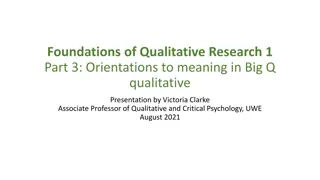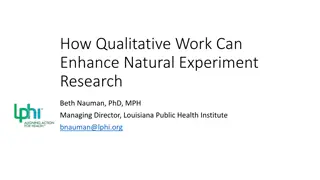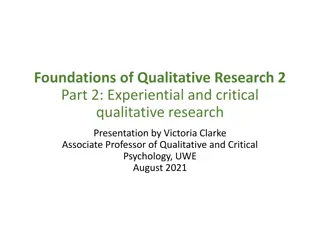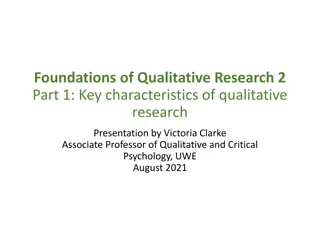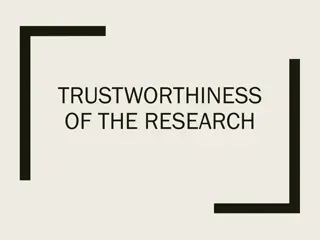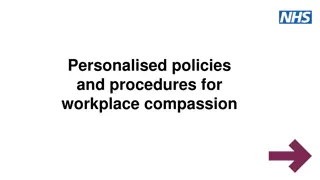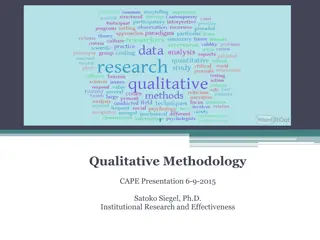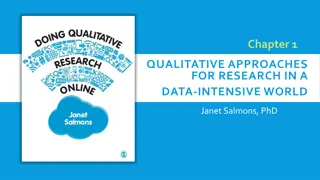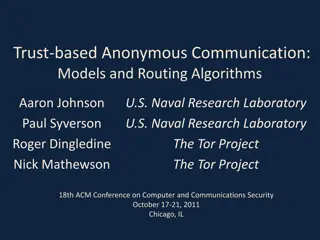Cultivating Compassionate Trust in Society: A Qualitative Exploration
This qualitative investigation delves into the concept of compassionate trust and its role in fostering positive societal interactions. Through a social constructionist lens, the study explores how individuals understand and embody compassionate trust, emphasizing the interconnectedness of compassion and trust in shaping a more empathetic and supportive society. The research highlights the significance of socially motivated action driven by hopeful trust and compassion for others, aiming to contribute to a greater collective good.
Download Presentation

Please find below an Image/Link to download the presentation.
The content on the website is provided AS IS for your information and personal use only. It may not be sold, licensed, or shared on other websites without obtaining consent from the author. Download presentation by click this link. If you encounter any issues during the download, it is possible that the publisher has removed the file from their server.
E N D
Presentation Transcript
Compassion and Trust: A qualitative investigation into fostering compassionate trust in society Lisa Jones Bucks New University Symposium 1 June 2019
Context Positive psychology too focused on individuals Emotion construction and language influences well-being What is trust? What is compassion?
Literature Individual choices impact wider society Positive psychology cannot remain value neutral Emotions and language: we shape society, society shapes us
Literature Trust has had little attention in positive psychology Hijacked by Behavioural Economics (e.g. game theory) Trust can be a virtue of collaboration
Literature Compassion is poorly understood by the West Shares qualities with trust: vulnerability, hope, action, and openness Together compassion can underpin trust to create compassionate trust
Working definition A mindset that aids socially motivated action. This is a form of hopeful trust, driven by compassion for others. This trust, despite one s own vulnerability, has the intention to connect emotionally and meaningfully with others, with the objective of contributing to something bigger than oneself.
Methodology Social constructionist epistemology Qualitative Semi structured interviews (4 participants) Appreciative Inquiry questions Thematic analysis
Methodology How is compassionate trust conceptually understood, and how could it be fostered within society? Two sub questions were also explored: How do interviewees make sense of and externalise compassionate trust ? In what ways do interviewees imagine compassionate trust as a lived mindset, evident within society?
Theme: Trust is fundamental but nuanced Highly complex and subjective Positive intention not selfish motive One participant saw forgiveness in trust, another didn t
Sub theme: Caring actions without trust Possible when actor has secure attachment, driven by altruism not ego Courage not well researched within compassion Courage through a form of hopeful trust
Theme: Compassionate trust has a cost Social change is multifarious, never free of tension Mixed emotions, showing strong emotional intelligence Giving power away: balance of power and love
Theme: Socio-cultural system a barrier Institutions take a realist perspective Disconnect between political institutions and communities System mistrust impacts well-being Positive psychology guilty of promoting selfish values!
Theme: Think global, act local Immutable connection between society and environment Self-enhancement (power and material wealth) incongruent with environmental and social values Small benevolent actions through communities
Theme: Raise awareness: Teaching and emulating the right values Education focused on compassion and trust Doing because it s good (not doing because it s good for YOU!) Role models Create conditions for change (stop being value neutral!)





